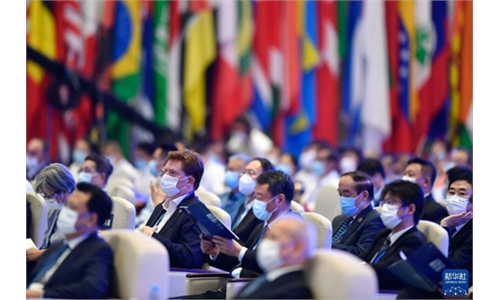Chinese internet companies discuss social responsibility amid tightened scrutiny
BAT executives reveal public welfare plans at high-profile forum

Alibaba displays some agricultural products whose packaging has been designed by Alibaba designers to help farmers marketing their goods at the 2021 WIC. Photo: Xie Jun/GT
In a year when China's internet based companies are facing tightening scrutiny from regulators, social responsibility has become a keyword at the 2021 World Internet Conference (WIC) Wuzhen Summit, with many companies displaying their social responsibility achievements in their expo booths, while senior executives from the so-called BAT companies (Baidu, Alibaba and Tencent) discussed social responsibility issues at WIC forums.
Jing Xiandong, CEO of Ant Group, told the Global Times on the sidelines of the WIC that the government aims to push "common prosperity" with high-quality economic development, and digitalization is one of the important methods to achieve the purpose.
"Against this background, representatives from tech companies have gathered here in Wuzhen with a sense of historic responsibility and urgency," he said.
At the WIC's Light of Internet area, where more than 300 internet companies displayed their latest technologies and solutions, the Global Times saw that Alibaba group showcased solutions and descriptions of social responsibility through written and visual displays. They also showed some agricultural products whose packaging was created by Alibaba designers to help farmers market their goods online.
"We have done quite a few things related to social responsibility, and we think we need to let the public see what we are doing in this area," an employee of the company told the Global Times at the booth.
He said that this is the first time that Alibaba has displayed content about corporate social responsibility during the WIC.
Risen Information Tech, a Hangzhou-based tech company, displayed a system that can help local governments analyze data about rural villages and less privileged areas. The product was launched this year in coordination with the government's common prosperity strategy, and it has been used by a number of departments under the Zhejiang provincial government, an employee of Risen told the Global Times.
On Monday, a forum named "Wu Talk, Social Responsibility of Internet Enterprises" attracted senior executives from almost all well-known internet firms in China, including BAT, Pinduoduo and Xiaohongshu. They explained their companies' strategies to carry out their social responsibilities, and they gave suggestions as to what internet firms could do to abide by government regulations.
Wen Jia, public affairs chief of Alibaba, said that Alibaba has been searching for a management system that combines technology and a mechanism to implement social responsibility. In particular, she said that Alibaba will assign social responsibility tasks to all employees, so that its workers could see that social responsibility is important not only to the company, but also to the whole society.
Liang Zhixiang, an executive from Baidu, suggested that internet platforms should increase their connectivity to facilitate regulation. He said that Baidu is willing to set an example for the industry and open its product lines to other internet platforms.
The companies are discussing their social responsibility plans in what is called "a year of management" for the internet sector, with the government tightening management of platform companies with measures ranging from clearing up internet content for juveniles to fining Alibaba for violating anti-monopoly laws.
Zhao Hejuan, founder of tmtpost.com, said that government regulation is very necessary, as the influence of the internet on the society has become ubiquitous now.
"Unrestrained development is only allowed at the beginning stage of any emerging industry, but laws and regulations are indispensable to the expansion of the industry. I believe the standardization is meant to help the internet industry grow better, instead of destroying it," Zhao told the Global Times on the sidelines of the forum.
She also said that anti-monopoly measures are necessary in any society to help small companies grow, but one important thing is how China can pursue anti-monopoly management with legal procedures.
"Our country has been developing the anti-monopoly legislation system, including setting up anti-monopoly departments and launching relevant laws. We are supportive of those measures," she said.



